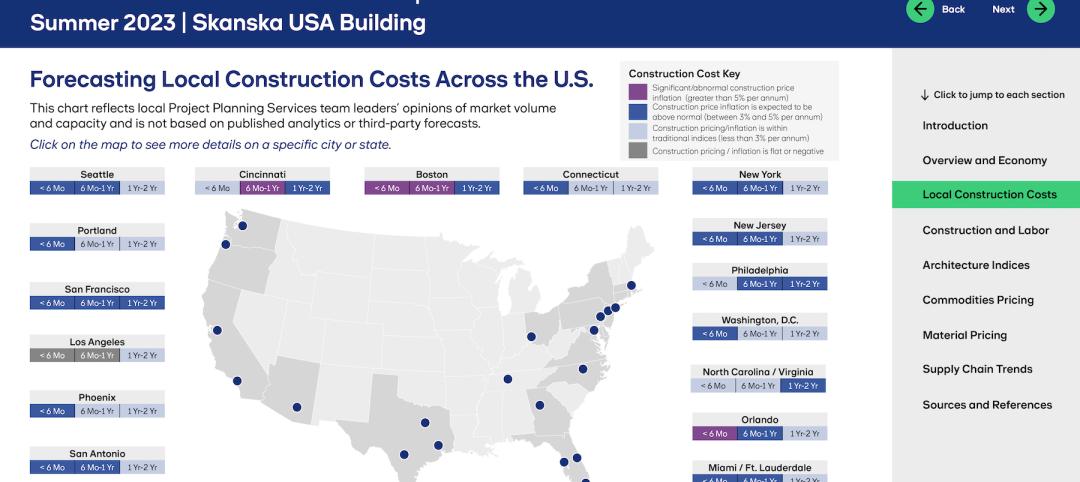Construction employment rebounded by 464,000 jobs in May, but the total remained 596,000 below the latest peak in February and the industry’s 12.7 percent unemployment rate was the highest for May since 2012, according to an analysis by the Associated General Contractors of America of government data released today. Association officials cautioned that the future job losses are likely as temporary federal support programs end, state and local officials deal with tighter budgets and private sector demand declines later this year.
“The huge pickup in construction employment in May is good news and probably reflects the industry’s widespread receipt of Paycheck Protection Program loans and the loosening of restrictions on business activity in some states,” said Ken Simonson, the association’s chief economist. “Nevertheless, the industry remains far short of full employment, and more layoffs may be imminent.
Simonson noted that the association’s latest survey found that nearly one-fourth of contractors reported a project that was scheduled to start in June or later had been canceled. He added that with most states and localities starting a new fiscal year on July 1, even more public construction is likely to be canceled unless the federal government makes up for some of their lost revenue and unbudgeted expenses.
The gain of 464,000 jobs in May followed losses of 995,000 in April and 65,000 in March, for a cumulative loss over three months of 596,000. Construction employment totaled 7,043,000 in May, about where it stood in late 2017, the economist noted.
The industry’s unemployment rate in May was 12.7 percent, with 1,187,000 former construction workers idled. These figures were roughly four times as high as in May 2019 and were the highest May levels since 2012 and 2011, respectively.
Association officials said the best way to avoid the expected future construction job losses is for federal officials to boost funding for infrastructure, including highway, bridges, waterways and airports. They noted that the additional funding would help cover expected state and local budget shortfalls and would help replace expected declines in private-sector demand.
“Government officials have done a good job providing temporary relief for firms struggling to cope with the economic impacts of the pandemic,” said Stephen E. Sandherr, the association’s chief executive officer. “As those temporary supports end, the broader economic realities of the lock-downs will cost countless construction jobs unless Congress and the Administration can work together to enact measures to revive the economy.”
Related Stories
Apartments | Aug 22, 2023
Key takeaways from RCLCO's 2023 apartment renter preferences study
Gregg Logan, Managing Director of real estate consulting firm RCLCO, reveals the highlights of RCLCO's new research study, “2023 Rental Consumer Preferences Report.” Logan speaks with BD+C's Robert Cassidy.
Market Data | Aug 18, 2023
Construction soldiers on, despite rising materials and labor costs
Quarterly analyses from Skanska, Mortenson, and Gordian show nonresidential building still subject to materials and labor volatility, and regional disparities.
Apartments | Aug 14, 2023
Yardi Matrix updates near-term multifamily supply forecast
The multifamily housing supply could increase by up to nearly 7% by the end of 2023, states the latest Multifamily Supply Forecast from Yardi Matrix.
Hotel Facilities | Aug 2, 2023
Top 5 markets for hotel construction
According to the United States Construction Pipeline Trend Report by Lodging Econometrics (LE) for Q2 2023, the five markets with the largest hotel construction pipelines are Dallas with a record-high 184 projects/21,501 rooms, Atlanta with 141 projects/17,993 rooms, Phoenix with 119 projects/16,107 rooms, Nashville with 116 projects/15,346 rooms, and Los Angeles with 112 projects/17,797 rooms.
Market Data | Aug 1, 2023
Nonresidential construction spending increases slightly in June
National nonresidential construction spending increased 0.1% in June, according to an Associated Builders and Contractors analysis of data published today by the U.S. Census Bureau. Spending is up 18% over the past 12 months. On a seasonally adjusted annualized basis, nonresidential spending totaled $1.07 trillion in June.
Hotel Facilities | Jul 27, 2023
U.S. hotel construction pipeline remains steady with 5,572 projects in the works
The hotel construction pipeline grew incrementally in Q2 2023 as developers and franchise companies push through short-term challenges while envisioning long-term prospects, according to Lodging Econometrics.
Hotel Facilities | Jul 26, 2023
Hospitality building construction costs for 2023
Data from Gordian breaks down the average cost per square foot for 15-story hotels, restaurants, fast food restaurants, and movie theaters across 10 U.S. cities: Boston, Chicago, Las Vegas, Los Angeles, Miami, New Orleans, New York, Phoenix, Seattle, and Washington, D.C.
Market Data | Jul 24, 2023
Leading economists call for 2% increase in building construction spending in 2024
Following a 19.7% surge in spending for commercial, institutional, and industrial buildings in 2023, leading construction industry economists expect spending growth to come back to earth in 2024, according to the July 2023 AIA Consensus Construction Forecast Panel.
Contractors | Jul 13, 2023
Construction input prices remain unchanged in June, inflation slowing
Construction input prices remained unchanged in June compared to the previous month, according to an Associated Builders and Contractors analysis of U.S. Bureau of Labor Statistics Producer Price Index data released today. Nonresidential construction input prices were also unchanged for the month.
Contractors | Jul 11, 2023
The average U.S. contractor has 8.9 months worth of construction work in the pipeline, as of June 2023
Associated Builders and Contractors reported that its Construction Backlog Indicator remained unchanged at 8.9 months in June 2023, according to an ABC member survey conducted June 20 to July 5. The reading is unchanged from June 2022.

















